 We have been taught that our minds decline with age. We become more forgetful, find it harder to learn, cannot focus as intensely, loose our creative powers and cannot master new technical specialties. Our brain cells die off, new connections don’t form and our brains shrink. A dark picture of increasing cognitive decline.
We have been taught that our minds decline with age. We become more forgetful, find it harder to learn, cannot focus as intensely, loose our creative powers and cannot master new technical specialties. Our brain cells die off, new connections don’t form and our brains shrink. A dark picture of increasing cognitive decline.
Fortunately, a growing number of studies show that some of these ideas are false and that we actually improve in certain aspects of cognitive performance as we age. We keep most of our brain cells and can form major new connections through something called neuroplasticity much later into life than previously thought. We develop greater abilities in drawing conclusions from examples, making judgement, seeing the meaning of situations and many other aspects of mental functioning.
In a recent blog post, Barbara Strauch, deputy science editor and health and medical science editor at The New York Times writes:
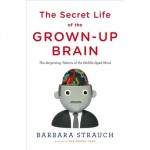 “Over the past few years, neuroscientists have begun to zero in on the brain’s changes in middle age, and what they’ve found is encouraging. Results of long-term studies show that — contrary to stereotypes — we actually grow smarter in key areas in middle age which, with longer life spans, now stretches from our mid 40s to our mid to late 60s.”
“Over the past few years, neuroscientists have begun to zero in on the brain’s changes in middle age, and what they’ve found is encouraging. Results of long-term studies show that — contrary to stereotypes — we actually grow smarter in key areas in middle age which, with longer life spans, now stretches from our mid 40s to our mid to late 60s.”
She expands on this point in her fourth coming book, The Surprising Talents of the Middle-Aged Mind.
The importance of this type of research for improving our minds and brains is significant. Why?
The assumptions we make about our own cognitive abilities strongly determines how well we perform.
For example, assuming you are forgetful, less creative, unable to master a second language or that math is impossible to learn all lower cognitive performance. Changing self-limiting assumptions about our own minds and the social stereotypes about aging brains mentioned above will take a long time. But it is a powerful means for improving cognitive performance and will be a frequent topic on the Next Brain Blog.
Source: Image of Older Adult
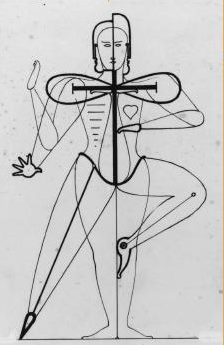 Over the last 20 years scientists have made good progress in understanding how our bodies impact the way we learn, think, solve problems manage emotions and do other mental tasks. A new view has emerged called embodied cognition that argues how our minds work is strongly determined by how our bodies interact with the world.
Over the last 20 years scientists have made good progress in understanding how our bodies impact the way we learn, think, solve problems manage emotions and do other mental tasks. A new view has emerged called embodied cognition that argues how our minds work is strongly determined by how our bodies interact with the world.
Embodied cognition has practical implications for improving cognitive performance and will be a frequent topic on the Next Brain Blog. For example, taking simple actions such as literally stepping back when faced with a tough problem or more complex actions such as taking a walk lead to better results.
This is an exciting result because it shows a very simple actions can immediately improve the performance of our minds and brains!
Talking and thinking with our hands, how we sit or hold our arms (body posture) and any sort of short-duration physical activity have all be shown to improve various aspects of thinking, problem solving and learning.
Take for example the 2007 study that was recently blogged about as, Unravel Problems by Folding Your Arms, in Psychology Today. The idea that folding your arms could in fact help you solve hard problems may seem a bit simplistic but there is some neuroscience behind it:
“Crossing our arms, Friedman and Elliot argued, sends our a brains a “proprioceptive cue.” “Proprioception” is the scientific term for our perception of the relative position of our body parts. When our arms are crossed it tells the brain to buckle down and get ready to work through a difficult problem. So next time you’re faced with a protracted project or a tough task, cross your arms to see it to a speedy, successful conclusion. Just remember, while our brains perceive crossed arms as a sign of perseverance, others may perceive it as a sign of boredom. Body language can mean many different things to different people in different situations-it’s part of what makes the field so exciting!”
If you are still skeptical watch the highly effective problem solvers around you. What do they do with their bodies when they are stumped?
Source: Image adapted from Moving Bodies.
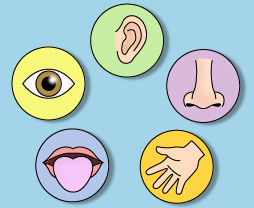 Being observant or attuned to the sounds, sights, smells, tastes and tactile feelings about you is a set of skills that can be learned. The more aware we are the richer our experiences and the more effective our brains and minds will be. Said another way, if we don’t hear, see, smell, taste or feel something it is hard to remember, think about, learn from or use it to solve a problem.
Being observant or attuned to the sounds, sights, smells, tastes and tactile feelings about you is a set of skills that can be learned. The more aware we are the richer our experiences and the more effective our brains and minds will be. Said another way, if we don’t hear, see, smell, taste or feel something it is hard to remember, think about, learn from or use it to solve a problem.
Small improvements in observational skills can lead to a big jump in cognitive performance.
Given this, developing skills to sharpen our senses will be a frequent topic on the Next Brain Blog.
But how do we go about improving our ability to perceive the world? There is no how-to manual. Fortunately, the art of perception is taught in many disciplines. For example, supercharging your skills of visual perception is taught in drawing and law enforcement classes. How to hear is taught in music appreciation. There are many lessons we can draw from these disciplines that will help us sharpen our senses in everyday settings.
Take for example the techniques for visual observation that are taught to security and law enforcement personnel. This blog post summarizes one such technique nicely:
“When you set out to develop your observation skills, there’s a simple exercise that you can do to help. When you encounter a person while in a public place, in the time that you are with that person, see what you can observe about him or her. Catalogue the person’s height, weight, build, hair color, eye color, clothing and any distinguishing marks as though you will have to describe the person to the police afterwards. Notice important and telling details like whether the person is wearing a wedding ring. Also notice the person’s body language, facial expressions and eye movements, see what hypothesis you can form about their emotional state. Be careful not to stare while you’re observing all of these things, you don’t want to come off as creepy. If you feel comfortable, engage the conversation and see which of your estimates were on the mark. Once you feel comfortable with this exercise, up the ante and see if you can observe 2, 3 or 4 people at once. As you go through these exercises, you’ll notice that your ability to observe will increase tremendously.”
You can do this yourself. If you try it or use a different technique for sharpening your senses leave a comment and share your experiences.
Source: Five Senses Image
Categories:
Perception Tags:
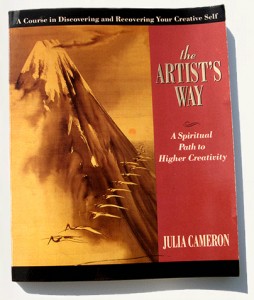 Individual creativity or the mental ability to generate new and relevant ideas on-demand is a highly prized skill. Although creativity is not fully understood there are many proven techniques we can use to improve it. Creativity will be a frequent topic on the Next Brain Blog.
Individual creativity or the mental ability to generate new and relevant ideas on-demand is a highly prized skill. Although creativity is not fully understood there are many proven techniques we can use to improve it. Creativity will be a frequent topic on the Next Brain Blog.
A great way to get started in developing your creativity is to work through a self-paced program such as The Artist’s Way. A primary technique the book teaches is called the Morning Pages.
“Morning Pages are three pages of longhand, stream of consciousness writing, done first thing in the morning. There is no wrong way to do Morning Pages– they are not high art. They are about anything and everything that crosses your mind– and they are for your eyes only.”
Doing this teaches your brain how to flow, initially without any specific purpose. But it is the first step. Much like “just start running” would be a first step in training for a foot race.
Doing Morning Pages for at least three months should produce a noticeable change in your capacity to think creativity.
For more detail on the Morning Pages and a second technique check out Basic Tools. This is a 16-page 8.5M PDF file.
If you have been using Morning Pages or other writing-based creativity techniques please leave a comment and share your experiences and results.
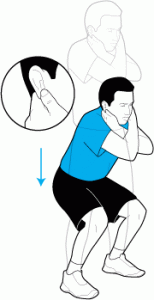 Doing Yoga can change how your brain functions. Yoga as a worldview, exercise routine and even a lifestyle offers important options for improving the performance of our minds and brains. The mind-enhancing effects of Yoga will be a regular topic on the Next Brain Blog.
Doing Yoga can change how your brain functions. Yoga as a worldview, exercise routine and even a lifestyle offers important options for improving the performance of our minds and brains. The mind-enhancing effects of Yoga will be a regular topic on the Next Brain Blog.
A simple Yoga exercise has been in the news lately. It involves holding your earlobes, placing your tongue on the roof of your mouth and rhythmically breathing while doing deep knee bends. Sounds a bit strange but it does not take long. According to many reports from teachers, doctors, therapists and scientists it produces results such as improved self-control, more mental energy and increased intelligence.
Check out this CBS news report for an introduction to the technique and what people are experiencing.
The news report mentions confirming EEG studies but I have not been able to locate those. I did find this post that offers this explanation:
“There is a lot of research to support that simple exercises like a breathing squat can improve function, focus and efficiency in the brain. Activation of specific acupressure points from the earlobes during the squat exercise stimulates the brain on the opposite side. Do the breathing squat exercise 21 times with the tongue touching the roof of the mouth. Exhale while squatting and inhale while standing up. Perform this movement with a 555 tempo. 5 seconds down-hold for 5 -5 seconds up. This simple exercise will activate chemicals in the brain, create synchronicity of the hemispheres, activate the pineal gland for awakeness and activate the pressure points of the ear lobes. The combination of crossing the midline, as well as stimulating the pressure points creates a perfect storm of electrical brain activity that stimulates neuropathways and can literally make you think better.”
If you want to give it a try be sure you are fit enough to do deep knee beds. You can find very clear directions on exactly what to do on eHow. If you do try it out please post a comment and share your results and experience.
Source: Exercise Image
Life is made up of a handful of critical decisions, hundreds of important decisions and literally thousands of minor decisions. Taking the time to develop good decision-making skills is well worth the investment. We will cover the topic regularly in the Next Brain Blog.
One proven way to enhance your decision-making skill is to actively manage the traps (also known as cognitive biases) that we can fall into. The Hidden Traps in Decision Making is an easy-to-read primer filled with practical advice. The traps or cognitive biases it covers include, for example:
- ANCHORING: Overemphasizing the first information you recieve
- STATUS QUO: Selecting alternatives that best fit what you are currently doing
- SUNK COST: Making decisions that support past decisions
- CONFIRMING EVIDENCE: Seeking and accepting information that supports your current or preferred point of view.
 We all have these tendencies. They cannot be eliminated, they are part of how our brain works. We have them because they provide strong advantages in certain circumstances. The key is to be aware of them and take simple steps to make sure they don’t trap us into making poor decisions. For example, one way to avoid the confirming evidence trap is to be sure you always find an equal amount of evidence for and against your prevailing point of view. Or ask another to scout the opposing evidence that you might be biased against seeing as relevant.
We all have these tendencies. They cannot be eliminated, they are part of how our brain works. We have them because they provide strong advantages in certain circumstances. The key is to be aware of them and take simple steps to make sure they don’t trap us into making poor decisions. For example, one way to avoid the confirming evidence trap is to be sure you always find an equal amount of evidence for and against your prevailing point of view. Or ask another to scout the opposing evidence that you might be biased against seeing as relevant.
Turns out we are loaded with dozens of biases that impact how we learn, perceive the world, make decisions, socially interact and perform other cognition-intense tasks. There will be a lot to blog about. Look forward to comments on how you have learned to manage decision-making or other types of cognitive biases.
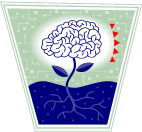 Studies have shown that if you spend a lot of time juggling or playing a musical instrument the parts of your brain that supports these activities grows bigger. London taxi cab drivers that spend a decade memorizing elaborate routes experience significant brain changes. These facts support a major premise behind this blog namely, we are far more in charge of the shape, size, longevity and performance of our brain than we realize.
Studies have shown that if you spend a lot of time juggling or playing a musical instrument the parts of your brain that supports these activities grows bigger. London taxi cab drivers that spend a decade memorizing elaborate routes experience significant brain changes. These facts support a major premise behind this blog namely, we are far more in charge of the shape, size, longevity and performance of our brain than we realize.
It would stand to reason that people who meditated extensively should have bigger brains. I have found a few studies that that support this idea but there is not enough data for a firm conclusion. In one study:
“Our data suggest that meditation practice can promote cortical plasticity in adults in areas important for cognitive and emotional processing and well-being,” says Sara Lazar, leader of the study and a psychologist at Harvard Medical School. “
In a second study:
“Using MRI scans the scientists show that there was “significantly larger cerebral measurements in mediators”.
No matter, even if mediation does not grow your brain there have been studies that demonstrate improved clarity of thinking, enhance self-control, reduced stress and self-reported well being. As such it is an important option for improving cognitive performance and will be a frequent topic on the Next Brain Blog.
 Buddhist insight mediation that advocates focusing on sensation rather than our thoughts of sensation seems to produce results. It is similar to the more modern movement of mindful mediation that focuses on “being in the moment”. Finally, there is a third, non-mediative approach to mindfulness that we will explore. It is based on the contemporary work of Ellen Langer and seeks to achieve a heightened state of situational awareness of conscious control over thoughts and actions. Insight mediation, mindful mediation and cognitive mindfulness.
Buddhist insight mediation that advocates focusing on sensation rather than our thoughts of sensation seems to produce results. It is similar to the more modern movement of mindful mediation that focuses on “being in the moment”. Finally, there is a third, non-mediative approach to mindfulness that we will explore. It is based on the contemporary work of Ellen Langer and seeks to achieve a heightened state of situational awareness of conscious control over thoughts and actions. Insight mediation, mindful mediation and cognitive mindfulness.
If you are interested in giving it a try I suggestion action over reading. Try this simple five-step experiment in mindful meditation.
Source: Mindfulness Image
Reading is a primary means of absorbing new information and knowledge. Improving your ability to read – faster, better comprehension and in novel ways – enhances learning capacity and creativity and so it will be a frequent topic on the Next Brain Blog.
 Increasing your reading speed without losing comprehension means saving time or read more in the same amount of time. If you normally read for an hour a day increasing your reading speed from 250 words per minute (international average) to 6oo means you can read approximately 150,000 words more per week. This is the equivalent of a meaty non-fiction book every week or 52 every year.
Increasing your reading speed without losing comprehension means saving time or read more in the same amount of time. If you normally read for an hour a day increasing your reading speed from 250 words per minute (international average) to 6oo means you can read approximately 150,000 words more per week. This is the equivalent of a meaty non-fiction book every week or 52 every year.
How fast do you read? Take this quick free test from RocketReader and find out.
There are proven techniques for increasing reading speed. For example, guiding, skimming and grouping are all proven to work. Other less proven techniques include minimizing subvocalization (talking aloud to yourself while reading) and widening your visual span (number/lengths of words you can taken in at a glance). You can learn to speed read from programs, books, workshops or software. We will discuss all these techniques and options on the Next Brain Blog. Let’s start with software as it affords easy experimentation as well as a good way to be systematic.
There are many software packages on the market that promise to improve your reading skills. Check out TopTenReviews of Speed Reading Software to get a quick overview of what is available. Prices range from $12 to $80 and the more fully features packages are likely worth the extra cost.
I plan on taking the Reader’s Edge (top-rated speed reading software) 30-day challenge and will blog on the results. In the meantime, if you have used speed reading software please post a comment and share your experiences and results.
In the Next Brain Blog we track down and report on a full-range of ways to improve the function and longevity of your brain and mind. There are many studies that prove physical exercise is good for your brain fitness and mental health.
But what type should you do, what specifically does it improve and how long do the effects last? A new piece of research reported in the Archives of Internal Medicine on Resistance Training and Executive Function gives some specific answers.
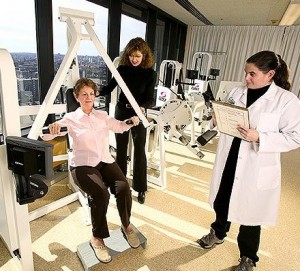 They found that for older female adults resistance training (dumbbells and weight machines) one or twice a week for a year improved their abilities to plan, make decisions, focus and resolve conflicts by more that 10%. These mental tasks all belong to what is called your executive function.
They found that for older female adults resistance training (dumbbells and weight machines) one or twice a week for a year improved their abilities to plan, make decisions, focus and resolve conflicts by more that 10%. These mental tasks all belong to what is called your executive function.
This is an impressive finding because it gives specifics on the type of exercise and the impact it will have. More to the point:
You can get a big boost in mental performance from a modest weekly investment in resistance training.
You don’t need to go to the gym or use fancy weight machines – low cost home exercise equipment will do the trick.
By the way, you can measure the efficiency of your executive function using the Stroop Test. I will blog on that later in the month.
Source: Image
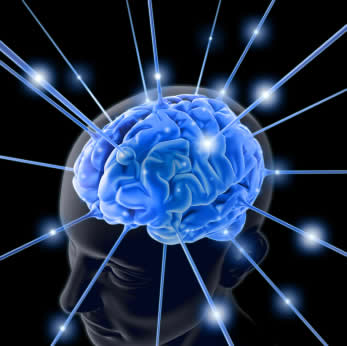 The core idea behind YourNextBrain! is that we have a wide-variety of ways to improve how our minds and brains work. You can for example, improve how keenly you perceive the world, make decisions, solve problems, manage emotions and generate new ideas. You can even improve how you learn. This is called learning-to-learn.
The core idea behind YourNextBrain! is that we have a wide-variety of ways to improve how our minds and brains work. You can for example, improve how keenly you perceive the world, make decisions, solve problems, manage emotions and generate new ideas. You can even improve how you learn. This is called learning-to-learn.
Making a conscious effort to improve our learning processes can pay a big dividend. Learning is both lifelong and lifewide – we are learning all the time and everywhere. Even a small improvement in how we learn is magnified greatly. That’s why I was excited to see the results of a new scientific study from New York University, A Mind at Rest Strengthens Memories, that offers a simple but powerful technique for improving how we learn. What they found is that memories are strengthen during periods of rest even when we are awake. The researchers advise:
“Taking a coffee break after class can actually help you retain that information you just learned,” explained Lila Davachi, an assistant professor in NYU’s Department of Psychology and Center for Neural Science, in whose laboratory the study was conducted. “Your brain wants you to tune out other tasks so you can tune in to what you just learned.”
Of course you don’t need to take a coffee break or be learning by going to class – the principle should work for any form of wakeful resting and learning activity.
For a little more background and insight check out the 4.5 minute video by the researcher.
____________________________________________________________
Source for blue glowing brain image can be found here.
 We have been taught that our minds decline with age. We become more forgetful, find it harder to learn, cannot focus as intensely, loose our creative powers and cannot master new technical specialties. Our brain cells die off, new connections don’t form and our brains shrink. A dark picture of increasing cognitive decline.
We have been taught that our minds decline with age. We become more forgetful, find it harder to learn, cannot focus as intensely, loose our creative powers and cannot master new technical specialties. Our brain cells die off, new connections don’t form and our brains shrink. A dark picture of increasing cognitive decline. “Over the past few years, neuroscientists have begun to zero in on the brain’s changes in middle age, and what they’ve found is encouraging. Results of long-term studies show that — contrary to stereotypes — we actually grow smarter in key areas in middle age which, with longer life spans, now stretches from our mid 40s to our mid to late 60s.”
“Over the past few years, neuroscientists have begun to zero in on the brain’s changes in middle age, and what they’ve found is encouraging. Results of long-term studies show that — contrary to stereotypes — we actually grow smarter in key areas in middle age which, with longer life spans, now stretches from our mid 40s to our mid to late 60s.”









